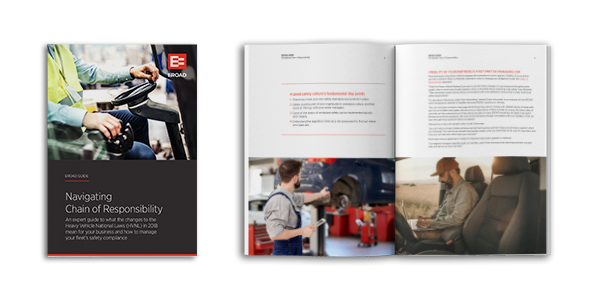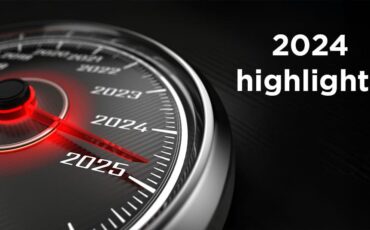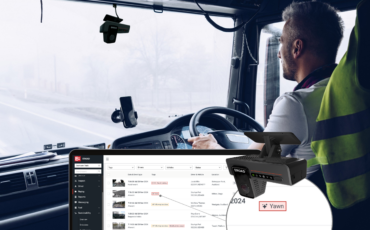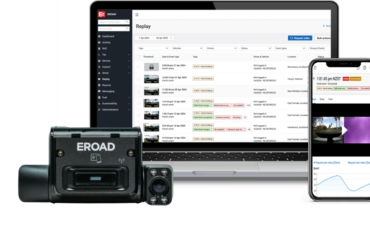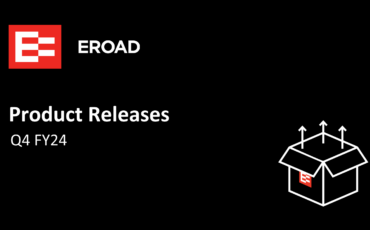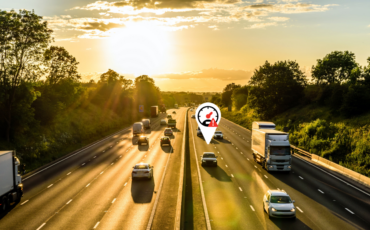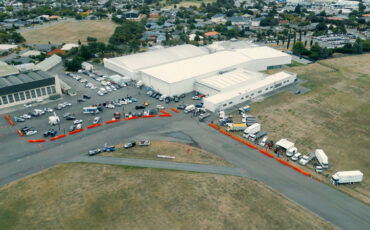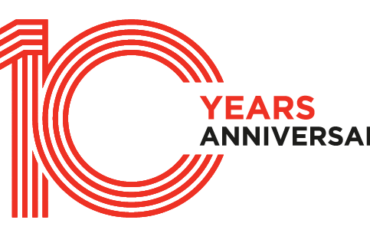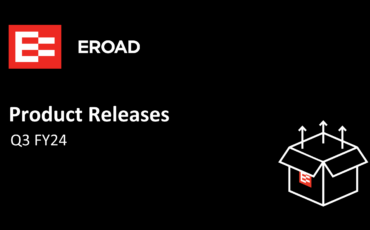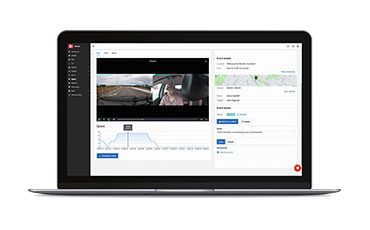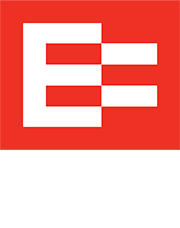What is Chain of Responsibility?
What is Chain of Responsibility?
The ultimate guide to everything you need to know about Chain of Responsibility to ensure your business is safe and compliant.
On 1 October 2018, amendments to the Australia Heavy Vehicle National Law (HVNL) came into force, including new Chain of Responsibility (CoR) legislation which now requires all organisations that use heavy vehicles (over 4.5 tonnes), regardless of industry, to take a more proactive approach to safety.
This changes the whole way your business needs to approach and manage the safety and operation of your heavy vehicles. Not only do the new laws have more wide-ranging powers and tougher penalties for breaches, it also confirms everyone with a role in your transport supply chain, both on and off the road, is collectively responsible for the safety of your transport operations.
Everyone, from your company directors and management team(s) to your consigners, dispatchers, loaders, contractors, partners and drivers, share the responsibility for the business being compliant and running safely, both on and off the road.
The CoR laws within the HVNL also require your business to have safety systems and controls in place to identify, assess and manage risks as they relate to your business and activities within your supply chain.
Chain of Responsibility: key focus areas
The Chain of Responsibility legislation has been developed to ensure your business stays safe and compliant across four core areas:
Speed
Fatigue management
Mass, dimension and load restraint
Vehicle standards
Every person involved in your chain has an obligation to ensure they have taken all reasonable steps to ensure their actions are, or were, in line with the road transport laws.
What does ‘taking reasonable steps’ mean under the Chain of Responsibility legislation?
Reasonable steps means everyone in your chain needs to take all necessary actions to ensure the safety of your team and the vehicles you run.
For example, if a driver is caught breaking the speed limit in order to make a specified delivery time, or driving while fatigued, everyone responsible for scheduling, delaying the driver unnecessarily or requiring that driver to undertake that journey in an unsafe manner could be prosecuted.
‘Reasonable steps’ includes (but is not limited to) your business:
- Implementing good business management, monitoring and safety practices and training to ensure your drivers and support staff don’t risk breaching the fatigue management or speed regulations
- Ensuring loads are weighed, measured and secure at all times
- Carrying out regular vehicle checks and maintenance to ensure your vehicles are safe and road-worthy
- Ensuring schedules are set with realistic, achievable timeframes, taking into account both the distances involved and the likely conditions the driver will face when on that route
- Ensuring loading and unloading activities are carried out efficiently and in a timely manner so that drivers are not unreasonably delayed
- Ensuring goods are packed securely
- Advising management of any delays
- Regularly engaging with other (external) parties involved in your chain to ensure safe practices are being followed
- Designing contracts and business agreements to ensure drivers and all other parties involved in the chain adhere to the law
- Carrying out, and reviewing, regular risk assessments
- Documenting all driver and vehicle activities, including journey times and vehicle speeds, scheduling and any issues or delays with loading or delivery times to ensure they are not only adhering to the law, but also to identify areas for improvement
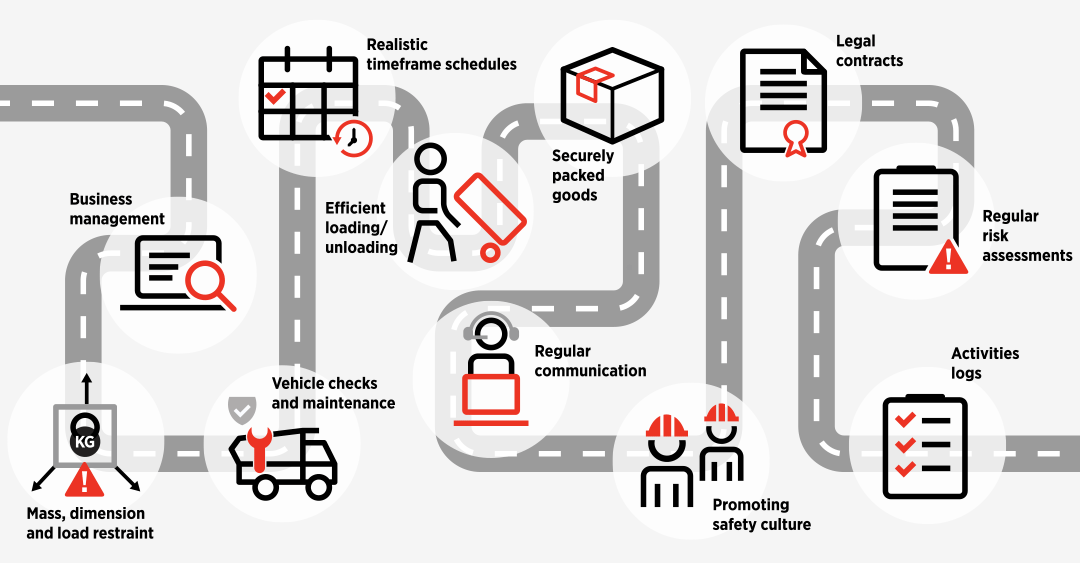
Tougher penalties now apply under Chain of Responsibility
The new Chain of Responsibility legislation switches the focus from a reactive to a more proactive need for everyone in the chain to manage safety.
It’s also important to understand that the risk of prosecution is also no longer dependent on a road offence actually taking place. Now, prosecutors only need to be able to establish that your business, or someone within it, hasn’t taken adequate precautions to avoid a foreseeable risk for charges to be laid against all those responsible in the chain.
These changes also come with tougher penalties. Individuals who are found to be responsible for a breach could be liable for a fine of up to $300,000 or five year’s imprisonment. Companies also face a fine of up to $3 million…so it pays to make sure your business is doing everything possible to proactively manage the risk.
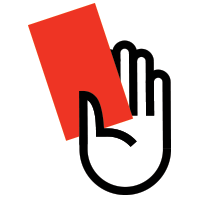
How do I ensure my chain is solid?
The best way to ensure your business is compliant is to develop a good safety management system to ensure all those within your chain are clear on your policies and procedures and what they need to do to stay compliant with all transport and safety legislation.
Developing a good safety culture is also fundamental. Keeping safety at the forefront of everyone’s minds across the chain not only helps your business meet your legal requirements, but it also ensures your people and others on the roads remain safe – which makes good business sense for everyone!
Compliance is also not a set and forget process – your business needs to continually review the performance of everyone in the chain, not just your drivers, to ensure you are meeting your obligations.
Fleet intelligence tools, such as EROAD’s smart telematics platform make compliance easier and can provide you with data and visibility of your company’s performance which also helps you improve efficiency and make better business decisions.
EROAD’s advanced telematics tools and reports can help:
Reduce speeding violations
EROAD’s complete telematics platform improves driver accountability. An EROAD study has found that vehicles where the driver was logged in had 50% less speed events than vehicles with no identified driver.
EROAD’s Ehubo2 helps identify not only vehicle activity, but also which driver was in the vehicle at the time via an onscreen driver login.
Improve vehicle safety
EROAD Inspect gives you the ability to track vehicle defects easily by capturing them during vehicle inspections and displaying them on the Defect Board — ready for you to take action.
Prevent fatigued driving
EROAD’s Ehubo2 helps manage driver fatigue by monitoring the distance and time a vehicle has been running. It allows Fleet Managers to monitor driving time on our desktop fleet management and reporting portal – Depot.
EROAD’s smart, intuitive platform helps mitigate fatigue risk through better trip planning so drivers and vehicles are safe even before they leave the depot.
Enhance driver behaviour
The key to creating a safer driving culture is to not only monitor driver behaviour, but to use big data and insights to continually help improve their awareness and skills. EROAD’s telematics solution bridges the gap between ‘after-the-event’ management reporting and in-cab, ‘behind-the-wheel’ influence on driver behaviour.
Our revolutionary, in-vehicle Ehubo2 device captures essential information on the driver’s behaviour and then provides immediate coaching feedback to remedy any issues immediately. The data is also available on our desktop fleet management and reporting portal.
Have full visibility across your supply chain
Visibility of your partner and sub-contractor fleets is essential in order to manage your obligations under the chain of responsibility.
EROAD’s Share allows you to have the same visibility of a partner or sub-contractor’s fleets as you have of your own. This gives you the ability to continue to deliver high-quality service to your customers, whilst ensuring the safety of all drivers working for you.
Access advanced driver analytics
EROAD’s Leaderboard allows you to compare your drivers with other fleets and vehicles in the EROAD network to help drive a culture of accountability and safety. You can also reward drivers for performance or changes in behaviour.
Being able to see, and show your drivers, how they compare with others is a simple way of demonstrating what they can do to improve their safety performance on the road.
Connects drivers with vehicles
With an easy-to-use driver login on the Ehubo2 in-cab device, the driver is clearly identified and linked to the vehicle they are driving, with personalised reporting available via Depot.
Provide advanced in-cap driver behaviour coaching
The combination of EROAD’s Ehubo2 and Depot software delivers a single, consistent platform for your drivers. You can monitor live vehicle and driver behaviour, such as seatbelt use and speeding, and EROAD’s Ehubo 2 delivers coaching and scoring to a driver directly in-cab.
Ensures responsible mass to load constraints
EROAD Depot gives schedulers a single view of current and scheduled jobs combined with full vehicle details, through our Partner Gateway and integration with key job management platforms like ICOS live and MyTrucking.
Chain of Responsibility – a snapshot
- Your business is now required to take a proactive approach to risk management
- Everyone within your supply chain – from schedulers, drivers to your management team is legally liable if something goes wrong
- CoR has been designed to improve safety, by recognising the responsibility shared across everyone in the transport chain – not just your drivers
- Documentation of your safety management systems and performance are now fundamental to good compliance
- Your business needs to ensure it has plans, policies and contingencies in place that are not only followed, but regularly reviewed to ensure compliance
- Tougher penalties apply for non-compliance and if you are found to have not taken adequate steps to ensure the safety of your team or the vehicles you run – even if an issue or breach of law hasn’t occurred
- Fleet intelligence tools, such as EROAD’s smart telematics platform, can help make compliance easy, provide full visibility of your business’ performance and also help drive further efficiencies.

